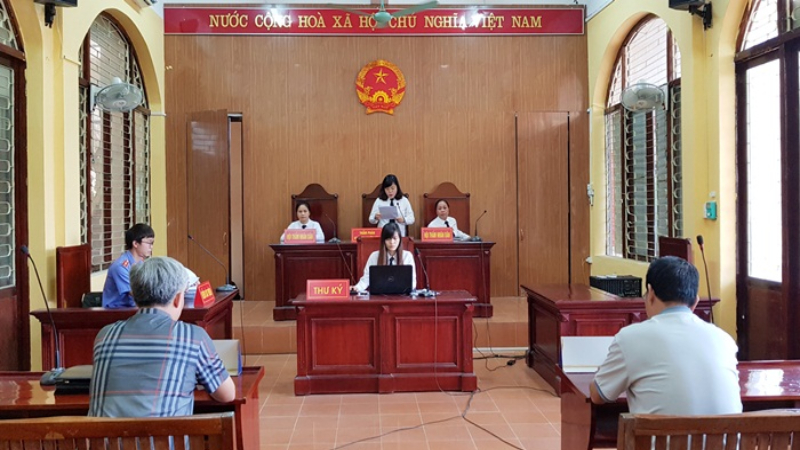Charges and fees payable in civil cases in Vietnam
What are the regulations on the charges and fees payable in civil cases in Vietnam? – Hoa Minh (Cao Bang, Vietnam)

Charges and fees payable in civil cases in Vietnam (Internet image)
Regarding this issue, LawNet responded as follows:
1. Charges and fees payable in civil cases in Vietnam
According to the provisions of Article 143 of the Civil Procedure Code 2015, charges and fees payable in civil cases include:
- Court fee advances shall include first-instance Court fee advances and appellate Court fee advances.
- Court fees shall include first-instance Court fees and appellate Court fees.
- Charge advances for civil matter resolution shall include first-instance charge advances and appellate charge advances.
- Charges shall include charges for providing copies of judgments, decisions or other documents of courts, charges for submitting applications requesting Courts to settle civil matters, charges for settlement of civil matters and other charges stipulated by law.
2. Obligation to pay fees and charges in civil cases in Vietnam
2.1. Obligation to advance Court fees and advance charges in Vietnam
According to Article 146 of the Civil Procedure Code 2015, the obligation to advance Court fees and advance charges is as follows:
- The plaintiffs, the defendants who have made counter-claims against the plaintiffs and the persons with related rights and interests who have made independent claims in civil lawsuits must advance first-instance Court fees;
The persons who have made appeals must advance appellate Court fees, except for cases where they are exempted from, or do not have to pay Court fee advances.
- Persons who have submitted applications petitioning Courts to settle civil matters must advance charges for the resolution of such civil matters, except for cases where they are exempt from, or do not have to pay the charge advances.
Regarding persons applying for recognition of voluntary divorces and agreements on child custody and property division upon divorce, husbands and wives may agree about the payment of charge advances, except for cases where they are exempt from, or do not have to pay the charge advances according to law provisions.
If spouses fail to agree the payment of charge advance, each of them shall pay a half of the charge advance.
2.2 Obligation to bear first-instance Court fees in Vietnam
The obligation to bear first-instance Court fees under Article 147 of the Civil Procedure Code 2015 is as follows:
- The involved parties must bear the first-instance Court fees if their petitions are not accepted by courts, except for cases where they are exempted from, or do not have to pay such fees.
- In cases where the involved parties cannot themselves determine their portions in the common properties and petition the Courts to settle the division of the common properties, each party must bear the first-instance Court fee corresponding to the value of the property portion she/he enjoys.
- Prior to the opening of Court sessions, the Courts shall conduct mediations; if the involved parties have reached mutual agreement on the resolution of cases, they must bear 50% of the first-instance Court fee level prescribed in Clauses 1 and 2 of this Article.
- The plaintiffs in divorce cases must pay first-instance Court fees, without depending on whether the Courts accept their petitions or not. In cases where both parties voluntarily agree on their divorce, each involved party must bear half of the first-instance Court fees.
- If an involved party to a case is exempted from the first-instance Court fee, then the other involved party shall still have to pay the first-instance Court fee payable under Clauses 1, 2, 3 and 4 of Article 147 of the Civil Procedure Code 2015.
- Where the case is suspended, the obligation to pay first-instance Court fee shall be decided when the resolution of the case resumes in accordance with the provisions in this Article.
2.3 Obligation to bear first-instance Court fees in Vietnam
The obligation to bear first-instance Court fees under Article 148 of the Civil Procedure Code 2015 provides as follows:
- The appellant must pay the appellate Court fees, if the appealed first-instance judgments or decision are upheld by the Courts of appeal, except for cases where the appellants are exempted from, or do not have to pay such fees.
- The appellants shall not pay the appellate Court fees, if the appealed first-instance judgments or decisions are amended by the Courts of appeal. The Courts of appeal must re-determine the obligation to bear first-instance Court fees as provided for in Article 147 of the Civil Procedure Code 2015.
- Where the Courts of appeal abrogate the appealed first-instance judgments/decisions for re-trial under first-instance procedure, the appellants shall not be obliged to bear the appellate Court fees.
The obligation to bear Court fees shall be re-determined when the cases are retried under first-instance procedure.
2.4. Obligation to bear charges in Vietnam
According to Article 149 of the Civil Procedure Code 2015, the obligation to bear charges is as follows:
- The obligation to bear charges shall be determined depending on specific types of civil matters and shall be specified in law.
- Regarding persons applying for recognition of voluntary divorces and agreements on child custody and property division upon divorces, husbands and wives may agree about the payment of charges, except for cases where they are exempt from, or do not have to pay the charges according to law provisions.
If spouses fail to agree the payment of charge, each of them shall pay a half of the charge.
Vo Van Hieu
- Key word:
- civil cases in Vietnam
- Cases of land rent exemption and reduction under the latest regulations in Vietnam
- Economic infrastructure and social infrastructure system in Thu Duc City, Ho Chi Minh City
- Regulations on ordination with foreign elements in religious organizations in Vietnam
- Increase land compensation prices in Vietnam from January 1, 2026
- Determination of land compensation levels for damage during land requisition process in Vietnam
- Who is permitted to purchase social housing according to latest regulations in Vietnam?
-

- What are the cases of joining or separating cases ...
- 18:08, 09/05/2023
-

- Vietnam: What is freezing accounts? What are the ...
- 15:36, 09/12/2022
-

- Regulations on settlement of civil cases according ...
- 16:07, 27/10/2022
-

- Notable new policies of Vietnam effective as of ...
- 16:26, 11/04/2025
-
.Medium.png)
- Notable documents of Vietnam in the previous week ...
- 16:21, 11/04/2025
-
.Medium.png)
- Notable documents of Vietnam in the previous week ...
- 16:11, 02/04/2025
-
.Medium.png)
- Notable new policies of Vietnam to be effective ...
- 16:04, 02/04/2025
-
.Medium.png)
- Notable new policies of Vietnam effective from ...
- 14:51, 21/03/2025
 Article table of contents
Article table of contents
